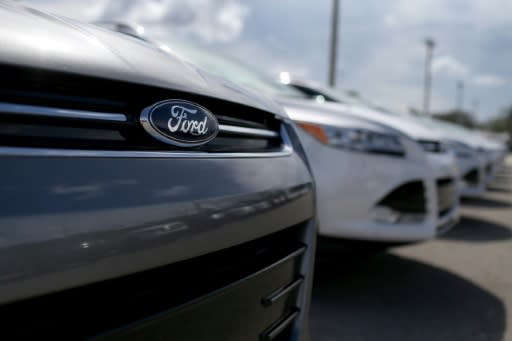US car sales slow down in January

US car buyers appeared to hit the brake pedal in the new year, as many auto makers on Wednesday reported a January sales decline following a record 2016.
GM, Ford, Toyota and the North American arm of Fiat Chrysler, FCA US, all saw sales dwindle, though it is a traditionally slow month for car makers as winter sets in and consumers recover from holiday spending.
Other car makers, with smaller US inventories, posted impressive gains, including Nissan, Honda, Mazda and Volkswagen. Most were buoyed by strong demand for light trucks and sport utility vehicles (SUVs).
GM's American sales fell 3.8 percent compared to January 2016, Ford was down one percent, while FCA US and Toyota each plunged 11 percent.
Total new-vehicle sales in January could decrease nearly percent compared to the year-ago, according to a forecast by Kelley Blue Book.
"After a record December capped a new record year of vehicles sales in 2016, January figures appear to be enduring a hangover effect, potentially falling more than half a million units from the previous month," KBB analyst Alec Gutierrez said in a statement last week.
Consumers who were still out shopping for cars in the sluggish sales month appeared to continue the trend of favoring light trucks, crossovers and SUVs, over sedans and compact cars.
The bigger vehicles often cost more, which helped profitability for GM, the biggest American auto maker, as consumers paid record average prices for its vehicles last month even "while key competitors sold down their large stocks of deeply discounted, old-model-year pickups," GM US sales chief Kurt McNeil said in a statement.
Ford said consumers were paying more on average for its vehicles, as well, thanks to strong demand for its pricier F-Series pickups, which was up 13 percent.
FCA US, struggling in many of its car models, including Chrysler, Fiat and Dodge brands, saw sales increase for Ram trucks and some Jeep SUV models.
Toyota also sold more SUVs, but fewer of its Camry, Corolla and Prius sedans. Its Lexus luxury brand took a 40.6-percent tumble, which the company blamed partly on low SUV inventories.
Nissan reported a 6.2 percent sales gain, thanks to its crossovers, trucks and SUVs, especially the Nissan Rogue crossover, which accounted for a quarter of all Nissan or Infiniti brand vehicles the company sold in January.
American Honda said its January sales increased nearly six percent, with its popular CR-V SUV accounting for more than a quarter of all vehicles sold.
Volkswagen, which said Wednesday it would pay an additional $1.2 billion to US customers in connection with its diesel emissions cheating scandal, posted an impressive 15 percent sales jump.
Meanwhile, Tesla said it sold an impressive 34.9 percent more of its electric vehicles, for a total of 2,800 units.
US car sales have enjoyed two consecutive years of record numbers. Last year, 17.55 million vehicles were sold, according to a tally by Autodata. And December saw a last-minute shopping frenzy, as auto makers offered discounts.
American consumers last year were most interested in light trucks and SUVs, which accounted for almost 60 percent of sales. Many auto makers have signaled that they plan to double-down on investments in these bigger models.

 Yahoo Finance
Yahoo Finance 